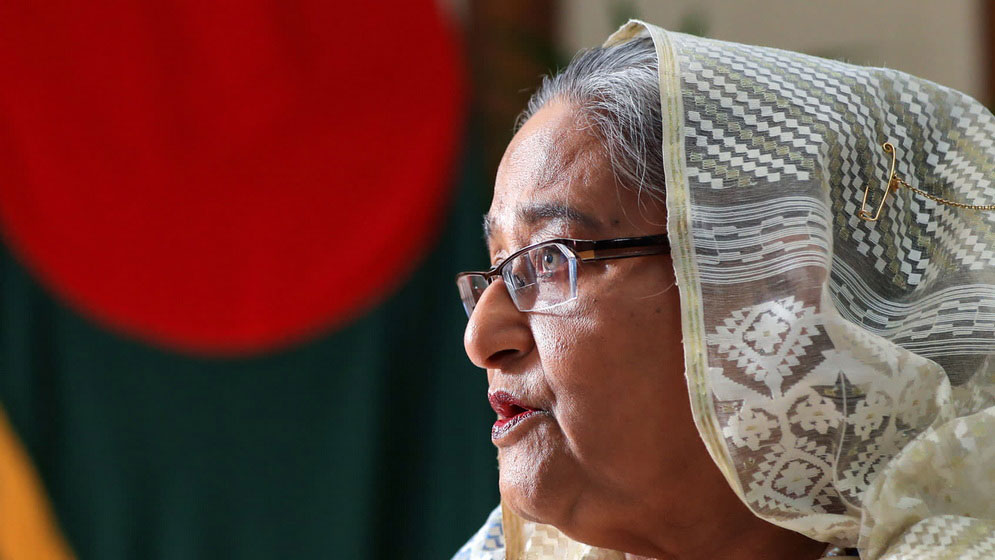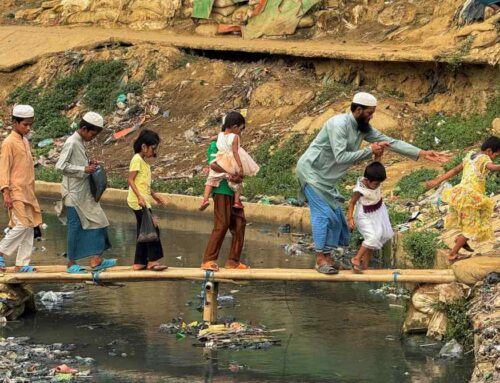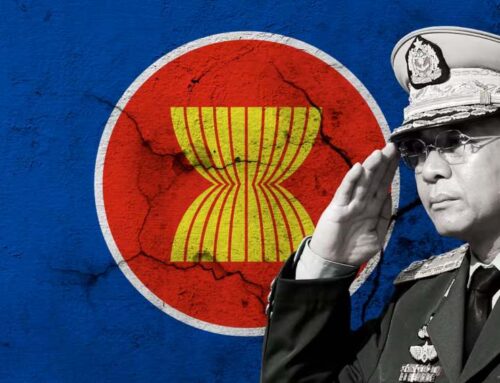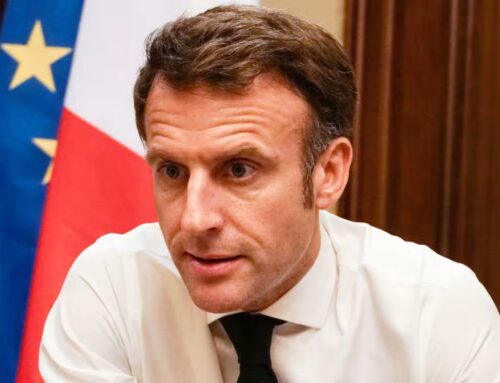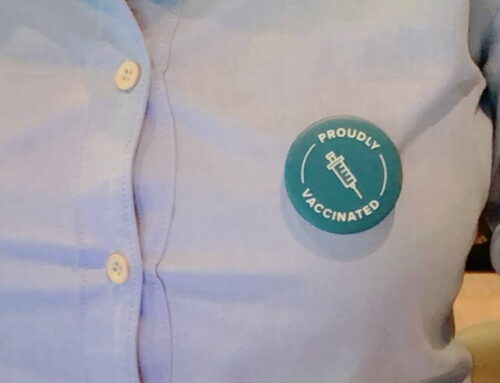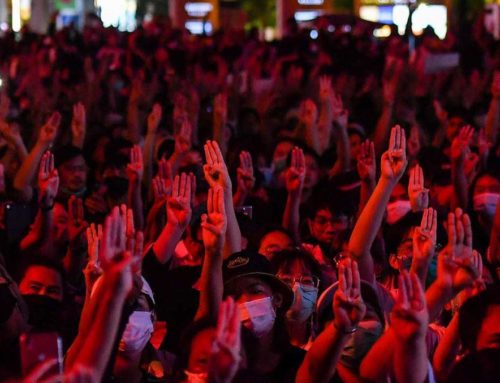Sheikh Hasina, Bangladesh’s PM, in her own words
{1st Photo Caption: Bangladesh Prime Minister Sheikh Hasina speaks during an interview in Dhaka on Dec.5. (Photo by Akira Kodaka)}
COVER STORY
Sheikh Hasina, Bangladesh’s PM, in her own words
GWEN ROBINSON, editor-at-large, Nikkei Asian Review
DECEMBER 19, 2018 13:21 JST
Prime Minister Sheikh Hasina has been in office since January 2009 as head of the ruling Awami League party. In that period Bangladesh has experienced record-breaking annual growth in gross domestic product, which has risen from 5.04% in 2009 to 7.86% in the financial year to June 30, 2018, as well as severe challenges ranging from natural disasters to terrorism.
Her policies and government face a crucial test on Dec. 30, when Bangladesh goes to the polls. The main opposition Bangladesh Nationalist Party boycotted the last elections in 2014, but is participating this time. If re-elected, Hasina will secure her fourth term as prime minister.
In an exclusive interview with the Nikkei Asian Review at her official residence in Dhaka, the capital, Hasina discussed a wide range of issues from Bangladesh’s growth model to Islamic extremism and the Rohingya refugee crisis.
This is an edited transcript of the interview.
Q: Bangladesh this year met United Nations targets to move from “least developed” to developing country status by 2024. What are the consequences of losing benefits such as trade preferences and aid?
A: Exiting LDC status gives us some kind of strength and confidence, which is very important, not only for political leaders but also for the people. When you are in a low category, naturally when you discuss terms of projects and programs you must depend on others’ mercy. But once you have graduated, you don’t have to depend on anyone because you have your own rights.
In terms of the future, we are investing heavily on priorities such as infrastructure development and job creation, which will help us reach our targeted growth rate
Bangladesh is now trying to get more people to pay tax to drive growth. From 700,000, the number of taxpayers now stands at around 3 million. At least 3.5 million people have tax identification numbers; 2 million of them file income tax returns. The government aims to increase the number of taxpayers to 3.5 million and the number of those registered with electronic tax identification to 5 million.
Q: How are you leveraging foreign relations to assist your economic growth?
A: Bangladesh is in a very comfortable position, having already established connections with neighboring countries, including the India-Bhutan-Bangladesh agreement. We also have the Myanmar-China-India-Bangladesh agreement we signed this year. Also, Japan has offered a big program. This has helped us launch strong connectivity efforts. The planned trans-Asian highway will go through Bangladesh. This will open up big economic opportunities for us, for investment as well as trade and business activities. The trans-Asian rail is already underway; we are now developing the roads, communications and building bridges. We have a program to establish 100 special economic zones throughout the country, 11 have been completed and 79 are under construction.
Q: If you are re-elected, what is your target for next year’s growth?
A: Next fiscal year we are forecasting 8.25%. Gradually, it will go up to 9% and then 10%. If re-elected, I can assure you that the program we have undertaken will get us up to 10% by 2021. We have exceeded recent growth forecasts. I always shoot for higher rates, why should I predict lower? But the more we grow, the harder it becomes to achieve 1% more. The Padma bridge project [a 6.1 km road-rail bridge across the Padma River to link southwest to north and east Bangladesh] will add at least 1.2% to our GDP.
And by then we will have our 100 new SEZs. We have offered many countries, including Japan, opportunities to establish industries there. Also, China, India, Middle Eastern countries and many others. For every country, we have a special lot. Countries can take the land and then distribute it to their own businesses as they wish. We will be able to develop all of the zones within two to three years.
Q: SEZs perhaps reinforce the image as a low-cost manufacturing hub. But what is your strategy to move up the value chain and attract higher quality investment?
A: Definitely, our export basket is very limited and we want to expand it. We are looking for new areas, new markets for export goods. We have undertaken big efforts to attract investors, and to expand industries — garments are already there; then there are industries such as leather, jewels, food processing and of course ICT [information and communication technology].
Q: Do you feel certain industries deserve more of a boost than others? For example, ICT benefits from generous incentives.
A: Every industry receives generous tax treatment and incentives. But we do want to encourage this new [ICT] sector, particularly for the younger generation. We have to create job opportunities for our 167 million-plus people, and the digital economy is a big part of that. We have established 5,725 digital centers around the country for anyone to go and learn. We have 8,500 post offices that have also digitalized; every local government has established a digital system and we have reached about 90% broadband connectivity in our country. Also, we have a satellite, which will open more job opportunities as well as help increase production.
Q: You have a team of advisers but where else do you go for advice?
A: Our children. Whenever we sit together, at the dining table or in leisure time, our discussions are about the country and how to develop it. I also draw inspiration from my late father [Sheikh Mujibur Rahman, first president of Bangladesh, assassinated in 1975]. I just know I am my father’s daughter. I just know I have to follow his vision, to develop this country and end poverty.
Q: Your government has an inflation target of 5.6% for the current fiscal year. How do you deal with inflation amid currency weakening and energy imports?
A: In 2009, our annual inflation rate was double-digit (9%-11%). We took steps to reduce it, and right now … inflation is 5.4%. We have been well aware of keeping inflation under control. In 2011, the inflation rate went up. We took swift measures and immediately brought it down to single digits. Every time, you have to observe and consider, and time and again take steps to control it. If you can just closely track it, you can control it.
Q: Energy is a growing challenge for the country.Can you discuss the project to build Bangladesh’s first nuclear power plant, and plans for a second plant?
A: Power, energy and communications are extremely important for economic development. 93% of our people now have electricity and we aim to achieve 100% coverage by mid-2019. The nuclear plant will start producing electricity in 2024. As for the second one, it depends. We are still searching for the land, although I would like to establish it in the southern part, which has been neglected. Once we get land, we will seek proposals — after the elections.
Q: What about other key infrastructure priorities?
A: We are developing another airport in Cox’s Bazar [in the southeast] with Japan’s help, and improving the Dhaka international airport. We want to develop more airports. Communication is very important. Railways, waterways, airports; we are developing all, to help investors achieve their goals. We have also established a new seaport in the south. In the Cox’s Bazar area, Japan is also investing in a power plant. I hope gradually Japan can develop that area as a seaport as well; it is a good opportunity.
Q: Cox’s Bazar is also the site of the Rohingya refugee camps; is there any prospective scheme to provide opportunities for long-staying refugees?
A: We signed an agreement with Myanmar, which agreed to take the refugees back. But it is not being realized. We hope the international community can play more of a role in facilitating their return. We cannot bear this burden for a long time [but meanwhile] we are developing one area, an island [Bhasan Char], building proper housing and opening opportunities for [Rohingya refugees] so that they can even earn some money. Right now they just sitting there, anything can happen. It is not true when people say the island is like a prison camp. It is beautiful, currently used for grazing cattle. Anybody can go there and see. After the election, I will go there. Once people start living there, we can further develop it. These people are now living in camps; it is not very hygienic. In the island, all the facilities will be there; they can live in a better way; children will get education, healthcare; we built a warehouse so we can deliver the relief. Right now, we are preparing for 100,000. But we can take 1 million there.
Q: Is there a solution to the Rohingya crisis, and are you concerned about the domestic political impact?
A: Of course there is a solution to the Rohingya crisis. It lies in Naypyidaw. Myanmar’s sincerity in resolving this crisis of their own making is critical in this regard. I am not concerned about the election impact [of the crisis]. I am very lucky that people trusted me.
Q: Why are Bangladesh’s foreign direct investment levels so low compared to other countries?
A: FDI has virtually tripled in 10 years. Investors are coming. FDI is increasing, no doubt about it. In my first period in government, it was so low. After this election, if we can conduct it in a peaceful manner, then I can show you how much FDI will come.
Q: One potentially worrisome spot seems to be banking. Critics say Bangladesh has too many banks, with too many problems.
A: In my tenure, we have allowed many banks to start operations. People are becoming accustomed to utilizing the banking system. So this creates problems in any country. But we can control it. Now more investors are coming, including domestic investors. Banks are working in a better way.
We do, however, have plans, after the election perhaps, to set up a commission to oversee the banking sector. Overall, when the economy is going, investment is flowing, you can always find flaws and loopholes. But it doesn’t mean the banking sector is worse; it is not.
Q: You have been criticized for cracking down on media, for example with a tough new digital security law. Do you feel criticism is justified?
A: In the past, we had only one TV broadcast network. In 1996, I opened it up. Now we have 44. What I am doing is for the good of my country and my people. I don’t care about criticism if I’m confident that our policies are good. I am concerned about my people and whether they are benefitting; who writes what is not a concern, although I am concerned about fake news and false impressions.
Q: Are you concerned about fallout from the U.S.-China trade war?
A: Our foreign policy is very clear: friendly relationship with everyone. What China and the U.S. are doing is between them.
Q: How welcome is opposition participation in the elections?
A: Of course, I wanted all registered political parties in Bangladesh to participate in our elections. To ensure that all parties participate, I took the unprecedented step of sitting down with the opposition to discuss their demands. All demands within the provisions of the constitution have been accommodated. However, extra-constitutional demands could not be accommodated. But the dialogues have been positive for our politics. The opposition parties are preparing for voting and participating freely in the electoral process. We are trying to ensure there is no breach or loss of peace.
Q: You are one of the world’s most experienced politicians, particularly among women leaders. Do you have any role models, and what do you consider the most challenging moments of your long career?
A: My parents are the only role models I ever needed in my life. Growing up as daughter of Bangabandhu Sheikh Mujibur Rahman, I saw first-hand the sacrifices he made in his quest to give Bengalis their own homeland. I saw his struggles for his language and his people. For most of his life, he was incarcerated for his political activism. Yet he persevered, never faltering in his goals of liberating and emancipating his people.
I also think very highly of my late mother, Begum Fazilatunnesa Mujib, who was the guardian angel in my father’s and our lives. Always standing by his causes, she was the reason my father could achieve what he did. In our darkest days, she was the force who held us together, kept us safe and made us feel loved. Her death in the tragic events of Aug. 15, 1975 was as much a loss for the nation as my father’s death.
In terms of challenges, I lived in exile for six years after nearly my entire family was killed. Not only were the killers not apprehended but the governments of that time formulated the infamous Indemnity Ordinance, which legally barred the trial of the killers and indemnified their actions. Not being able to get justice, while living in forced exile, was one of the most difficult moments for me and my young sister Sheikh Rehana.
After I returned to Bangladesh in 1981, I devoted myself to reorganizing my party, the Awami League, and the movement for restoration of democracy. Up to the early 1990s, this struggle continued as I not only faced threats and intimidation from the military government, but also struggled with some of the leaders of my party. Throughout that time, the killers of my family were roaming around with powerful government and political patronage.
As leader of the opposition … I had to fight against terrorism, extremism, communalism and political violence. My party’s leaders and activists, and religious minorities were targeted. Many were killed and hounded. The rise of state-sponsored terrorism via groups such as Jamaatul Mujaheedin and state-linked corruption and violence against political opponents posed a serious threat to the security and continuity of our country.
On Aug. 21, 2004, the radical group Harkat Ul Jihad linked to Bangladesh Nationalist Party leaders launched a deadly grenade attack on one of my party’s rallies, which killed 24 people and over injured 400. I myself was injured. This era was one of the most difficult times. In 2007, I was arrested on false corruption charges by the then military-backed caretaker government. I stayed in solitary confinement for months. Being cut off from my people, my party and my family during these dark months was also one of the most challenging periods of my life.
Q: Have you ever felt at a disadvantage being a woman in a male-dominated world, particularly in an Islamic country?
A: There are obvious social and cultural obstacles to women reaching their full potential, especially in Bangladesh. But that bias against women is now changing. More and more men are accepting the growing visibility of women outside their homes. The big increase in women’s education, workforce participation, role in the armed forces, politics and administration all stand as testaments to that fact. According to the International Labor Organization, Bangladesh is the only country where the factor-weighted hourly wage gender pay gap is positive. But we need to continue giving priority to women’s empowerment until we attain gender equality in all aspects of society.
In terms of religion, I don’t feel that my faith has ever held me back. On the contrary, it has been a source of strength and helped me through the many challenges. I have never mixed religion with politics, and never saw any difference between myself and people of other faiths. Thus, for me, faith was never an obstacle to my progress, despite being a woman in a Muslim majority country.
Q: The country has seen growing Islamic fundamentalism. But how do you answer concerns about the impact of increased security on personal freedom?
A: Several major anti-terror operations, thwarting of a number of high profile intended attacks and continuing prosecutions and convictions against hundreds of terrorists and violent extremists, have devastated the ability of groups such as Jamaatul Mujaheedin Bangladesh to mount any credible attack or cause chaos.
However, this is only one aspect of Bangladesh’s struggle against terrorism and violent extremism. We are also working to prevent, as well as counter, terrorism and violent extremism through a plethora of social, educational and religious measures. In 2010, the government formulated a strong anti-extremism National Education Policy, which highlights the need for reforming the madrasa Islamic religious school curriculum.
The government also introduced anti-extremism chapters in academic textbooks. Additionally, the Ministry of Education has been organizing awareness programs against terrorism in different schools and colleges.
Source Link: NIKKEI ASIAN REVIEW
Related Articles:
The rise and rise of Bangladesh – NIKKEI ASIAN REVIEW
COVER STORY – Main story
The rise and rise of Bangladesh
The economy is booming. Does Sheikh Hasina deserve the credit?
Bangladeshi voters wary of ruling party despite economic growth – Nikkei Asian Review
COVER STORY – Side story
Bangladeshi voters wary of ruling party despite economic growth
Critics of Prime Minister Hasina say little chance that polls will be fair
